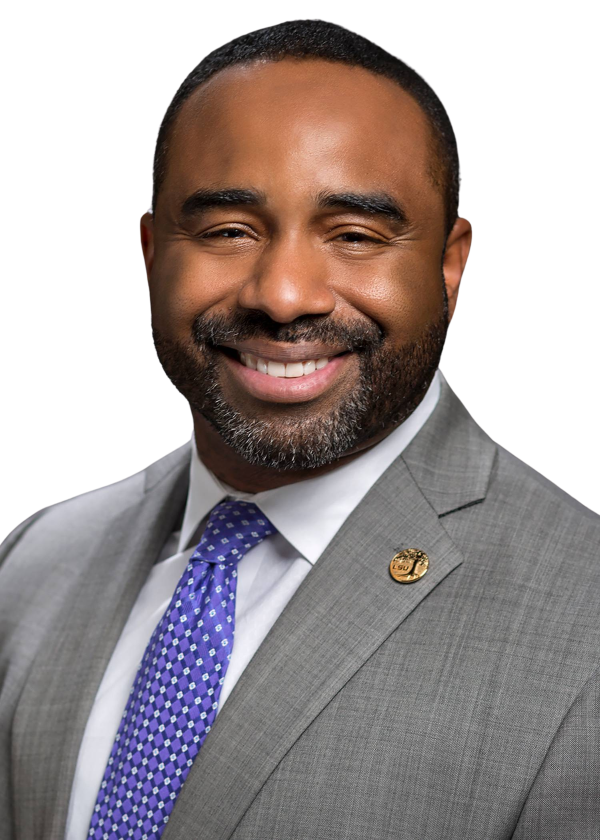Transformative Education: LSU's Commitment to Louisiana's Future
INSIGHT INTO DEAN ROLAND MITCHELL'S RESEARCH AND HOW THE LSU COLLEGE OF HUMAN SCIENCES & EDUCATION WILL ADVANCE THE SCHOLARSHIP FIRST AGENDA

A Discussion with Roland Mitchell
Please briefly describe your research. How did you decide to focus on this particular area? How is it important to you?
In the spring of 1987 I was a sophomore in high school locked in a life or death battle with the mole-mass problems in Ms. Biggs’ fifth period Chemistry class. I was a strong student in her Biology class the prior semester with a burgeoning scientific identity, so I had no idea why the class seemed so difficult. Attempting to better understand this early educational disconnect, after several tutors and roughly three decades of schooling drives my research interests today. Simply put, I conduct inquiry into the understandings educators need to effectively communicate their subject matter knowledge to an increasingly diverse student population. At the postsecondary-level we typically focus on ensuring faculty are content experts; however, outside of schools of education, faculty receive little if any training associated with how to communicate content knowledge to students. In many cases highly skilled faculty are left with simply parroting the approach to teaching that they picked up from their professors and subsequently attribute less than desirable student outcomes to an inherent lack of ability and/or poor preparation at the secondary level.
The reason I struggled in my Chemistry class was because I transferred in from a Catholic school where students took Religion courses in their freshman year while their public school peers were taking Physical Science. Hence, I missed an entire year of the foundational blocks for learning Chemistry and did not understand the broader context of schooling enough to bring this critical gap to my guidance counselor’s attention, much less to formulate intelligible questions in my Chemistry class. This one case of a lapse of information and resulting misguided assessment of academic ability is amplified on a grand scale given the ubiquitous complexities associated with the nationwide incongruence between a majority white female middleclass monolingual teaching force, and the increasingly diverse student population they serve. Against this backdrop, numerous highly trafficked tropes concerning the lack of effort and or inherent intellectual ability by both teachers and students has led me to aggressively seek out the often systematically focused and sociopolitically informed insights needed to increase the opportunity for educational success for ALL students.
What impacts have you seen from your research? How have these impacts shaped your career?
The impact of this line of inquiry is most evident at the graduate level through my advising and the ultimate success of the brilliant students that I have had the honor of learning alongside. Since my initial appointment as an instructor at LSU in 2005, through my current assignment as dean, I have chaired nearly 70 dissertation committees composed of students who have gone on to lead centers and institutes at prestigious intuitions like Brown University and the Universities of Pittsburg and Washington as well as numerous faculty and administrative appointments nationally to include several key leadership positions here at LSU. Specifically, during my tenure as program lead, the School of Education produced Black men with doctoral degrees at five times the national average and was viewed as a place where answers concerning success for ALL students were being born. There is no “secret sauce” or “magic bullet” for achieving these outcomes. In the end, success occurs as a result of a simple belief that as a faculty member, mastery of subject matter is not enough. All the content in the world is worthless if it is incommunicable.
How does your research relate to LSU’s Scholarship First Agenda? How can education and the human sciences, and the College of Human Sciences & Education in particular, impact and serve Louisiana?
The College of Human Sciences and Education serves Louisiana as a leading producer of critically needed allied health providers, social workers, librarians, teachers, and countless other community-enhancing professions. Our research addresses significant societal issues like cancer, obesity, education, poverty, mental health, and healthy workplaces. It’s our passion to enact positive change for all Louisianans. My research advances this work by establishing the pathways to higher learning for an increasingly diverse set of citizens in every parish across the state as referenced in the Scholarship First Agenda, by equipping faculty with requisite skills to be better teachers. In the end, effective teaching is at the heart of increased retention, graduation, and participation in the job market to address profound problems and improve quality of life.